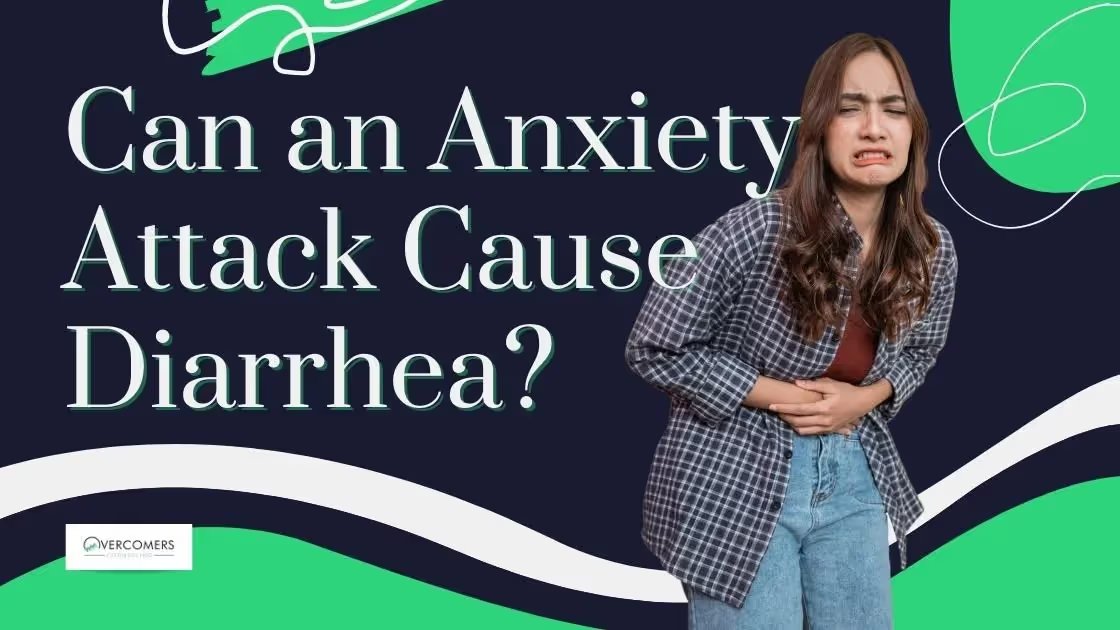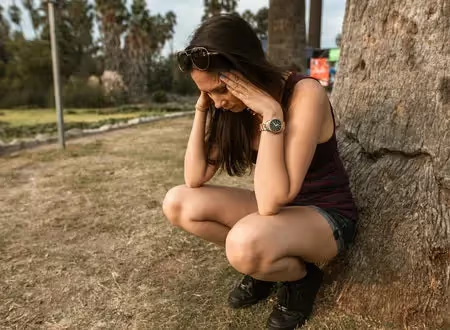Sometimes when people get unusually anxious, they begin to experience symptoms of diarrhea.They are left with one question in mind.Can an anxiety attack...

Sometimes when people get unusually anxious, they begin to experience symptoms of diarrhea.
They are left with one question in mind.
Can an anxiety attack cause diarrhea?
Yes, anxiety attacks don't only cause diarrhea but can damage your digestive system.
When you are anxious, your body releases hormones and chemicals such as cortisol and adrenaline into the bloodstream.
These chemicals get into the digestive tract, destroy everything, and result in a chemical imbalance that leads to diarrhea or other gastrointestinal symptoms.
In this article, you will learn the answer to the question, can anxiety attacks cause diarrhea, what diarrhea is, and how it can be controlled and treated.
Diarrhea is a disease that can happen for different reasons, and it usually stays between one to three days.
Diarrhea makes you quickly run to the bathroom with urgency, and this may happen more often than normal.
This disease is caused by a virus, anxiety attack, stress, and sometimes contaminated food.
The sickness may also make you feel bloated, have abdominal cramping, and experience nausea.
Diarrhea can also be a symptom of some disorders such as irritable bowel syndrome or inflammatory bowel disease.
Some of the symptoms of this disease include watery stool and stomach pain.
If you have been asking the question, can anxiety attacks cause diarrhea, I'm sure you now know the answer is YES.
Diarrhea is a dangerous disease that can result from anxiety.
It happens because of the connection between your brain and guts, known as the gut-brain axis.
The gut-brain axis connects with your central nervous system (CNS) and enteric nervous system (ENS), which acts as your gut nervous system.
This Enteric Nervous System helps you process and regulate the gastrointestinal tract, but it also affects your behavior and emotion because it is linked to your brain.
Anxiety is a disorder that can cause diarrhea.
When you are distressed, the chemical messenger signals your guts, which respond with some symptoms like diarrhea.
This disease affects you in multiple ways.If it affects your digestive system, you might experience other psychological symptoms.Anxiety causes diarrhea in two ways: psychological and physical.
The former occurs when your mind is anxious, and the latter occurs through the nervous system.If it affects your digestive system, you might experience other psychological symptoms.

Knowing an answer to the question, can anxiety attacks cause diarrhea isn't enough but you also need to know who can get diarrhea.
However, diarrhea can be serious in certain groups of people, including:
For all of these people, diarrhea can cause other health problems.
Knowing the answer to the question of whether an anxiety attack can cause diarrhea isn't just enough but knowing to treat it is also essential.
Taking an antidiarrheal drug without a prescription from the doctor may cause more problems.
Try these remedies to ensure you don't just know what anxiety attacks can cause.
Based on the National Institute of Diabetes and Digestive and Kidney Diseases' answer to the question of can anxiety attacks cause diarrhea; they recommend some foods that can be used to prevent and cure diarrhea at home.
Eating a bland diet is great to cure yourself of any diarrhea illness.
Eating a bland diet is recommended because it helps ease any digestive distress, and since diarrhea is one of the diseases of digestion, it makes it a good option.
There are four typical bland diets, and it is mostly a curable diet because it is a low fiber food.
They are.
Bananas, as one of the categories of a bland diet, are really helpful because it helps to restore all potassium your body might have lost through diarrhea.
It is also important you don't eat food or drinks that can cause gas, such as:
Eating a bland diet is good and if you notice any symptoms of diarrhea and it lasts for three days without changing, check the kind of food you are eating.
This is important because Diarrhea can worsen if you eat high-fiber foods such as rice, grains, and greasy foods.
Use Probiotics
Taking some probiotics, which means taking live microorganisms that are intended to have health benefits when consumed or applied topically can make diarrhea go away quickly.
With the question, can anxiety attacks cause diarrhea?
Yes, if not taken care of, it will cause diarrhea and affect the stomach and intestine.
But probiotics can help replace any microorganism and restore bowel functions.
Here are some probiotics you can take that will be helpful.
You must avoid some dairy products so that the probiotics can be effective.
But some dairy foods like yogurt are beneficial.
One of the biggest problems of having diarrhea is dehydration.
This is one of the reasons why many people who have this disease are rushed to the emergency room.
Anxiety attack that causes diarrhea also makes the body lose a large amount of water and all the electrolyte it needs to function properly.
And the electrolytes like sodium and potassium are needed in the body.
You also need to understand that a dehydration remedy is not all about drinking water, so it should be handled properly; otherwise, it can become dangerous.
So the best way to do this is to drink plenty of fluids like water, juices, broth, and not just water.
Talking about anxiety attacks can cause diarrhea, you are not permitted to drink all fluids.
It would be best to avoid fluids like coffee, sugary drinks, sodas, alcohol, and prune juice.
This is important because they affect your health.
In essence, ensure you avoid dairy products.
When to see a doctor
Now we have answered your question can anxiety cause diarrhea, let's look at when you need to seek help.
If you're experiencing symptoms of diarrhea after an anxiety attack and notice that symptoms are not going away, speak to your doctor.
This is a very important one; if you notice nothing changes after trying all home remedies, talking to a medical professional will be the best option.
Seeing a doctor will help you if you are experiencing anxiety attacks or any digestive issues.
You need to make an appointment with a doctor if:
Seeing a medical professional isn't just good for treatment only, but it will also help you determine what's causing your symptoms and offer the necessary drugs or treatments.
You must have seen an answer to the question:
Can anxiety attacks cause diarrhea by this time?
Diarrhea is a disease that can come and go within a day or may come to stay and disrupt your plan.
But when you see that an anxiety attack causes your diarrhea, take low-fiber foods, avoid foods that can affect your digestion systems, and visit the doctor when necessary.
You will be relieved from the symptoms and enjoy yourself as usual by doing this.
It's important that you feel comfortable discussing personal matters with your therapist in order to open up and get more out of therapy sessions; therefore finding someone who meets certain criteria like experience level, expertise areas, and personality is key when selecting a therapist who can give meaningful feedback about how best handle issues related to anxiety or other mental health concerns.
Other activities which have been found helpful in reducing both immediate feelings of anxiousness and long-term anxieties associated with chronic disorders include yoga, journaling, nature walks, art therapy, volunteering, and other low-stress activities. Additionally, developing a healthy lifestyle incorporating adequate sleep, physical activity, and nutritious meals can help reduce overall stress levels.
Ignoring anxiety can exacerbate symptoms and make it more challenging to manage over time. This can result in a negative impact on your personal, professional, and social life, leading to feelings of isolation and even depression.
To reduce your anxiety, you can practice relaxation techniques such as deep breathing, progressive muscle relaxation, guided imagery, and mindfulness practices. Additionally, regular exercise has been found to be beneficial in managing stress and improving mental health.
Yes, Medicaid provides insurance coverage for therapy services specifically designed to help individuals struggling with anxiety, depression, and other mental health conditions.
Addressing anxiety is crucial because it can significantly impact your quality of life and overall well-being. Left untreated, anxiety can lead to more severe mental health issues, relationship problems, and difficulty functioning in daily life.